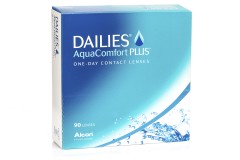Red eyes: List of common causes & remedies

Are red eyes cause for concern?
Everyone has experienced red eyes at some point in their life. They can be harmless and stick around temporarily. Sometimes, however, red eyes are a sign of a more serious eye condition. In any case, you should check your eyes regularly and consult your ophthalmologist if you have pain or other symptoms that come along with your red eyes.
Before they become a problem, the opticians at Lentiamo are happy to describe the causes and treatment options for red eyes!
How do red eyes develop?
In a healthy eye, the conjunctiva and sclera of the eye appear whitish. In an irritated or overstrained eye, the blood vessels dilate to provide better blood flow to the eye. This is an eye's natural protective mechanism and it is what makes your eye appear reddish.

Sometimes you'll have an idea of why your eyes are red. For example, if you've worn your contact lenses more than usual, you might notice your eyes become red but will quickly return to normal once you've removed them. Red eyes shouldn't be a permanent state. It's important to find the cause and treat it.
Causes of red eyes
Red eyes can have a wide variety of causes. They can appear from time to time or be chronic. If the cause is unknown, the eyes will continue to be unnecessarily strained. Both eyes or just one can be affected.
Here are some causes of red eyes:
- Lack of sleep
- Dry air (e.g. due to air conditioning systems)
- High UV exposure due to extreme sunlight at the seaside or high in the mountains
- Ruptured blood vessels which can be brought on by a strong sneeze or coughing fit
- Conjunctival injury or conjunctivitis (also known as pink eye) caused by viruses or bacteria
- Inflammation of the iris or cornea
- Allergies (e.g. due to pollen, animal hair, cosmetics)
- Contact lenses, wearing contacts for too long or poor contact lens hygiene
Red eyes present as a symptom with some eye diseases such as inflammation of the conjunctiva, cornea, sclera or eyelids, glaucoma or ocular herpes as well as tumors. Such cases should be evaluated by your ophthalmologist in order for you to receive the best possible treatment.
If you've suffered an injury to the eye - from a sharp object for example - and it has resulted in a red eye, you should contact your ophthalmologist immediately.
Symptoms of red eyes
As the name of the problem suggests, redness of the eyes is the most common symptom of red eyes. Any other accompanying symptoms are dependent on the cause. You may experience scratching, burning or itching. In some cases, watery eyes and swollen eyelids are possible.
If it is a bacterial infection, a whitish discharge and sticky eyes may also occur. Some people also become more sensitive to light or experience mild pain in the eyes.
Allergies often cause red eyes that come with a runny nose.
Identifying symptoms can be helpful in figuring out what's causing your red eyes. Depending on the cause, it is advisable to consult your ophthalmologist, especially if you feel any of the following accompanying symptoms:
- Severe pain
- Blurred vision or sensitivity to light
- Fever
- Nausea and vomiting
What helps red eyes?

Treatments for red eyes can vary greatly. If your red eyes are caused by lack of sleep, then sufficient rest is the solution. If you suffer from allergies, try to find the irritant and avoid it. If you have a pollen allergy, well-fitting sunglasses can help.
If you're suffering from pain and have severely reddened eyes, your ophthalmologist will take a detailed medical history. It is important to find out what has led to this and what exactly the accompanying symptoms are. An examination of the anterior segment of the eye can provide clarity. This will help your doctor suggest the best possible treatment for you.
Various eye ointments, drops or gels are often used to combat red eyes. In the case of bacterial conjunctivitis, antibiotic ointments and drops are often used. However, if it is an allergy, antihistamines are prescribed.
The best eye drops for red eyes
If your eyes feel excessively dry, eye drops or gels can minimise the discomfort. Read our medically reviewed article on the 10 best-selling eye drops for dry eyes.
Home remedies for red eyes
Are you wondering what you can do yourself to prevent red eyes? Always prioritise good hygiene and only touch your eyes after washing your hands. Avoid any excess rubbing or scratching. In addition, cooling compresses often feel pleasant on the eyes. Finally, drinking plenty of water also helps with dry, red eyes.
It's important to get enough rest as well as avoid strong winds and extreme sunlight. A quality pair of sunglasses from your optician will protect your eyes from excessive UV exposure and can prevent red eyes.
Red eyes with contact lenses
If you are a contact lens wearer and have red eyes, it's best to wear your glasses to provide some relief to your eyes.
If contact lenses are continuously causing your red eyes, then you should see your optician. They will examine your eyes and lenses. Poor contact lens hygiene or wearing contact lenses for too long is often the cause. Always follow the instructions from your optician regarding storage and cleaning of your contact lenses.
Are red eyes dangerous?
In general, red eyes do not pose a threat to your health if they do not have other accompanying symptoms. Often the eyes are just dry. Temporarily abstaining from alcohol, getting more sleep, regularly drinking water and special eye drops can help. If, despite these measures, you suffer from red eyes and notice severe pain or discharge, please see your ophthalmologist immediately.
Read more
Want to learn more about topics such as cataract surgery or swollen eyes? Read about them in the Lentiamo guide on eye diseases.







Comments